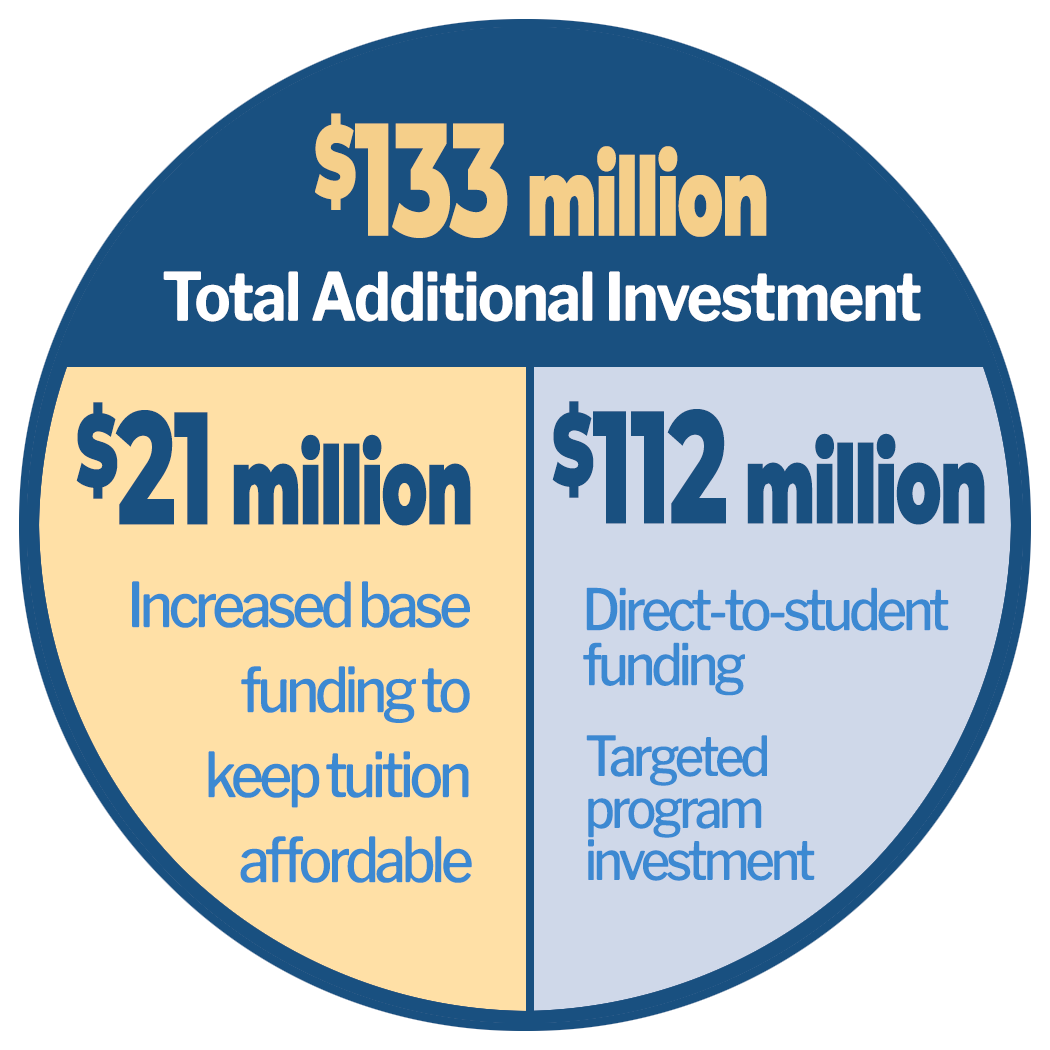October 20, 2022
State System Seeks State Investment to Graduate More Students in High-demand Careers
Contact: Kevin Hensil, khensil@passhe.edu
Harrisburg, PA – To address Pennsylvania’s talent shortage in industries critical to communities,
to open doors of opportunity for thousands of low- and middle-income students of all
ages, and to strengthen the state’s workforce and economy, the Board of Governors
for Pennsylvania’s State System of Higher Education (PASSHE) is requesting the state
provide an inflationary funding increase and a targeted investment to educate students
for careers in high-demand fields.
 The State System requests:
The State System requests:- 3.8% increase ($21 million), average annual percent increase in inflation over the past three years, for an investment of $573.5 million to enable the State System to freeze undergraduate tuition for all students for an unprecedented fifth consecutive year.
- $112 million for a separate strategic investment to enroll and graduate students prepared for careers in fields with significant labor shortages. The fields are healthcare, education, engineering, social work and computer science.
“The State System remains tremendously thankful to the governor and legislature for
the historic investment in the 2022-23 state budget,” said Board of Governors Chairwoman
Cynthia D. Shapira. “Their partnership with us and our students is a testament to
the success of our ongoing System Redesign to transform higher education and meet
the changing needs of students and the workforce.
“This funding request would benefit all of our students by allowing the System to
freeze tuition for an unprecedented fifth year. At the same time, our state can strategically
target investments to help students enroll, graduate and enter jobs that have labor
shortages and are vital to our communities.”
Following the largest growth of new student enrollment in 12 years, this funding request
is built on data that matches in-demand jobs and strong academic programs at PASSHE
universities, which can expand to generate more graduates for those careers.
“This is a plan to invest in students and thus graduate more people able to enter
fields that are essential to the health and well-being of Pennsylvania, and where
there are worker shortages,” PASSHE Chancellor Daniel Greenstein said. “Our workforce
needs more healthcare workers to provide medical care, teachers to educate our children,
engineers to improve our infrastructure, social workers to relieve people's suffering
and improve lives, and computer scientists to enhance and secure our digital world.
“The State System is ready to meet the demands of our workforce. This proposal creates
the path for students of all ages to get an affordable degree or credential to start
jobs in high-demand fields, strengthen the workforce and do the work that all of us
need them to do.”
Pennsylvania’s workforce has a talent gap, with 60% of jobs requiring some higher
education after high school, but only 51% of workers having a degree or credential.
As the state-owned universities of Pennsylvania, PASSHE has an obligation to respond
and to produce more graduates to help close the gap.
To do its part in closing the talent gap and to continue as an engine of workforce
development, the State System is expanding beyond the declining population of traditional
college-age students. In this next
phase of System Redesign it will enroll and graduate non-traditional students, such as those ready for college
but not considering enrolling, former students with incomplete degrees, and working
adults who need short-term programs to earn industry credentials necessary to change
jobs or advance their careers.
Additionally, the State System is offering a broader range of credentials than the
bachelor’s, master’s and doctoral degrees that have focused its attention. These include
credentials that may be earned in a matter of months as opposed to years, and that
lead directly to well-paying, essential jobs so students can quickly enter the workforce
and earn a living wage – sustaining themselves and their families while having the
flexibility to continue their education.
Employee and student engagement
During the meeting, a recent survey of students, faculty and staff that gathered data
on the level of their engagement in the campus community was discussed.
“Research data show that students perform better when they, along with employees,
feel a strong sense of belonging to their campus communities,” said Chancellor Greenstein.
“That’s why we routinely conduct such surveys – to find out where we are and gain
perspective on how we can improve in the interest of our students.”
A key part of engagement is the extent to which community members feel welcomed given
their race/ethnicity, and their gender, political, religious and other identities.
“Public universities bring together people with vastly different backgrounds and perspectives,”
said Dr. Denise Pearson, vice chancellor and chief diversity, equity and inclusion
(DEI) officer. “This creates an enormous opportunity to cultivate communities whose
members learn to listen to and respect diverse opinions and experiences, and as a
result ensure all feel welcomed and respected.”
Pearson also previewed the
State System DEI Summit scheduled for Nov. 2-4. DEI experts will join students, faculty, staff and others
to further commitment to diversity, equity and inclusion across PASSHE campuses.
About PASSHE
Pennsylvania’s State System of Higher Education (PASSHE) is the public university
system of the commonwealth with a mission to provide a high-quality education at the
lowest possible cost to students. With 90% of its students from Pennsylvania, PASSHE
educates approximately 85,000 degree-seeking students, with thousands more in certificate
and career programs. The universities collectively offer more than 2,300 degree and
certificate programs in more than 530 academic areas. Across the System, there are
more than 800,000 living alumni, most of whom live in Pennsylvania.